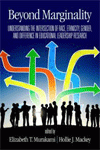
Beyond Marginality
Understanding the Intersection of Race, Ethnicity, Gender and Difference in Educational Leadership Research
Edited by:
Elizabeth T. Murakami, University of North Texas
Hollie J. Mackey, The University of Oklahoma
Published 2018
The book Beyond Marginality: Understanding the Intersection of Race, Ethnicity, Gender and Difference in Educational Leadership Research promotes new theoretical and conceptual frameworks for the study of race and ethnicity in educational leadership. In this volume, new generations of scholars of color are moving beyond research that has not been necessarily focused or generated by diverse groups. The authors are purposeful in transcending systemic inequities and injustices in the stratified representation of practitioners and researchers by bringing in a new movement with innovative and impactful theoretical and conceptual frameworks in educational leadership.
CONTENTS
Preface: Honoring Difference — The New Norm in Educational Research? Susan C. Faircloth (Coharie). Introduction: The Need for Alternative Theoretical and Conceptual Frameworks for the Study of Race, Gender, and Ethnicity in Educational Leadership, Elizabeth T. Murakami and Hollie J. Mackey. SECTION I: CONCEPTUALIZING FRAMEWORKS THAT CONSIDERS RACE, GENDER, ETHNICITY, AND DIFFERENCE IN EDUCATIONAL LEADERSHIP. Access to Opportunity Framework: Conceptualizing Class to Race, Hugh M. Potter and Brian Boggs. Preparing Educational Leaders for Queer Inclusion in Schools, Valerie Royaltey-Quandt. Conceptualizing Indigeneity and Gender in Educational Leadership Inquiry: Applying a Framework for Systemic Critique to Problems of Practice, Hollie J. Mackey. Developing Culturally Responsive Mentoring in the Professoriate: A Theoretical Model, Brenda Lloyd-Jones and Marilyn Y. Byrd. Grappling With Methods and Methodologies: The Tug of War of Following Our Heart and the Research Process, Liliana E Castrellón, Rudy Medina, and Nereida Oliva. American Indian/Alaska Native Graduate Student Experience in STEM: Conceptual Perspectives, Catherine M. Johnson, Carrie B. Myers, Kelly A. Ward, Dusten R. Hollist, and Nick Sanyal. SECTION II: THEORY TO PRACTICE FRAMEWORKS THAT CONSIDERS RACE, GENDER, ETHNICITY AND DIFFERENCE IN EDUCATIONAL LEADERSHIP. Employing an Affective, Linguistic, and Cognitive (ALC) Framework: An Asset-Based Approach to School Leadership, Fernando Valle, Irma Almager, and Vanessa de León. A Cross-National Framework for the Study of Latina/o School Leaders in Mexico and Texas, Elizabeth T. Murakami, Carmen Celina and Torres Arcadia. A Proposition for a Holistic Approach to Adaptation and a Unified Sense of Self: A Conceptual Framework in Educational Settings, Detra D. Johnson. Conceptual Model of Traditional and Nontraditional Forms of Parental Involvement of English Language Learners, Joseph N. Cerna. The Role of Gender and Transformational Leadership: A Synopsis, Janelle C. Simmons. Galvanizing Inclusivity: A Conceptual Framework for Actionable Strategies to Cultivate Inclusive Schools, Rana Tasnin Razzaque. Leadership in Practice: A Paradigm to Support Educational Leaders of African American Male Students, Lawrence L. Scott II. SECTION III: CONCLUSION. Conclusion: Guiding Frames and Centering Context for Race, Ethnicity Gender, and Difference in Educational Leadership Research, Hollie Mackey and Elizabeth T. Murakami. Epilogue: Moving Beyond Marginality, Gaëtane Jean-Marie. About the Editors. About the Contributors.
-
Paperback978-1-64113-216-9
Web price: $45.04 (Reg. 52.99)
-
Hardcover978-1-64113-217-6
Web price: $80.74 (Reg. 94.99)
- eBook978-1-64113-218-3

- EDU032000 - EDUCATION: Leadership
- EDU037000 - EDUCATION: Research
- EDU048000 - EDUCATION: Inclusive Education
-
 (Re)Envisioning Social Studies Education Research
Current Epistemological and Methodological Expansions, Deconstructions, and Creations
(Re)Envisioning Social Studies Education Research
Current Epistemological and Methodological Expansions, Deconstructions, and Creations
-
 Affirming Identity, Advancing Belonging, and Amplifying Voice in Sororities and Fraternities
Affirming Identity, Advancing Belonging, and Amplifying Voice in Sororities and Fraternities
-
 Creating New Possibilities for the Future of HBCUs
From Research to Praxis
Creating New Possibilities for the Future of HBCUs
From Research to Praxis
-
 Expanding the Vision of Faculty Learning Communities in Higher Education
Emerging Opportunities for Faculty to Engage Each Other in Learning, Teaching, and Support
Expanding the Vision of Faculty Learning Communities in Higher Education
Emerging Opportunities for Faculty to Engage Each Other in Learning, Teaching, and Support
-
 Faculty Learning Communities
Working Towards a More Equitable, Just, and Antiracist Future in Higher Education
Faculty Learning Communities
Working Towards a More Equitable, Just, and Antiracist Future in Higher Education
-
 Promoting Equitable Classroom Practices in Higher Education
Approaches Beyond Curriculum
Promoting Equitable Classroom Practices in Higher Education
Approaches Beyond Curriculum
-
 The Handbook for Aspiring Higher Education Leaders
The Handbook for Aspiring Higher Education Leaders

